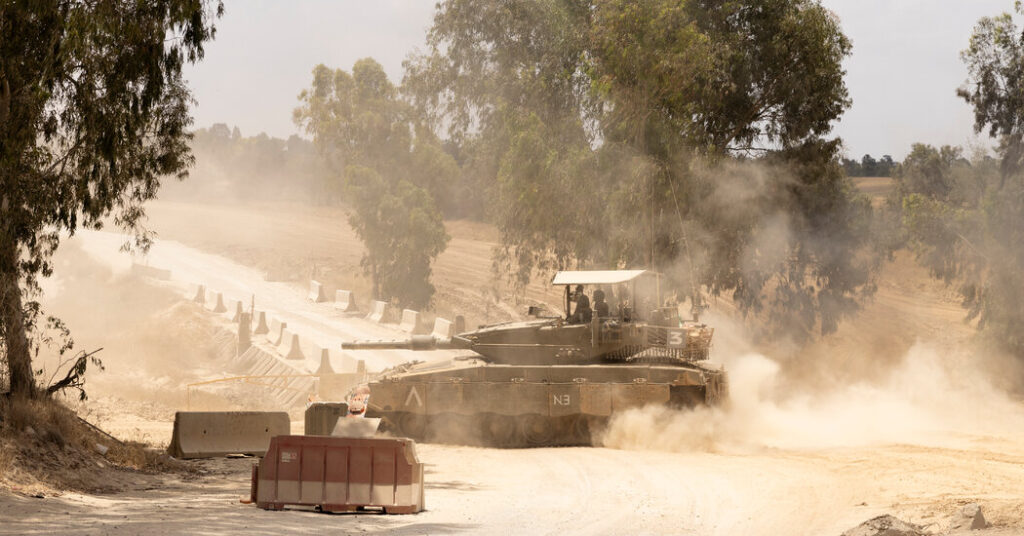An Israeli attack in southern Gaza that killed dozens of Palestinians was a tragedy but did not violate President Joe Biden’s red line on withholding arms shipments to Israel, U.S. officials said on Tuesday.
The bloodshed follows Biden’s warning earlier this month that the United States would block certain arms transfers if Israel targets the densely populated area of Rafah – a warning that has been tested regularly as the war has deepened.
White House spokesman John F. Kirby said the deaths were “devastating” but that the scale of the attack was not enough to change U.S. policy. “We don’t want to see a large-scale ground operation,” Mr Kirby told reporters. “We haven’t seen that yet.”
Kirby said Israeli tanks were parked on the outskirts of the city “trying to put pressure on Hamas.” He also offered a level of specificity to Biden’s warnings about Israel, which critics said were too vague.
“We haven’t seen them send out large forces and large numbers of troops in columns and formations to engage in some kind of coordinated maneuver against multiple targets on the ground,” Kirby said. “Everything we’ve seen tells us that they “There are no major ground operations into the population center of Rafah.”
Biden faces pressure from supporters and members of his own party to use his authority to cut weapons against Israel to influence its conduct in the war. The United States is by far Israel’s largest arms supplier and the rising death toll has raised questions about U.S. responsibility.
Sunday’s attack in Rafah sparked a deadly fire that killed at least 45 people, including children, and injured 249 others, according to Gaza’s health ministry. It sparked outrage from the international community, including from leaders of the European Union, the United Nations, Egypt and China.
Asked about Rafah on Tuesday, Vice President Kamala Harris said “tragedy is simply not an adequate word” for the deaths. She did not answer a follow-up question about whether the strike crossed Mr. Biden’s red line.
Still, the Israeli military’s behavior is similar to what Biden said he would not tolerate in an interview with CNN earlier this month, when he warned that the United States would not provide Israel with weapons to attack Rafah. arms.
“I’ve made it clear to Bibi and the War Cabinet that if they do go into these population centers, they’re not going to have our support,” Biden said in the interview.
In that interview, Biden stressed that the United States would still ensure Israel’s security, citing the Iron Dome missile defense system and his support for Israel’s “ability to respond to an attack.” But he said he would block the delivery of weapons aimed at densely populated areas of Rafah.
The area that came under attack on Sunday was not included in an evacuation order issued by Israel in early May, and some Palestinians who have taken refuge in the camp said they considered it a safe zone.
The Israeli military said Sunday’s attack targeted a Hamas compound and used “precision munitions” to target a commander and another senior official there. Prime Minister Benjamin Netanyahu said it was a “tragic accident” that killed civilians.
According to the United Nations, about one million people have fled Rafah during the Israeli attack on the city, many of them living in the west of the city and in areas surrounding the camp that was attacked on Sunday.
U.S. State Department spokesman Matthew Miller said the United States was closely following Israel’s investigation into the incident.
“Israel has indicated that there may be a Hamas ammunition depot near the area where they launched the attack,” Mr. Miller said. “This is a very important factual question that needs to be answered.”
Israeli warplanes fired the “minimum munitions” they could use, Israeli military spokesman Maj. Gen. Daniel Hagari told a news conference, adding that “it would be impossible to ignite a fire of this size with our munitions alone.”
Israel invaded Gaza on October 7 after a Hamas-led attack killed approximately 1,200 Israelis. Israel’s retaliatory offensive has killed more than 36,000 people, many of them women and children, according to Gaza health officials.
World leaders, including Joe Biden, have warned of the danger of a major military operation in Rafah without proper plans to evacuate displaced Gazans who have taken refuge there.
Mr. Miller was unable to provide details about the hundreds of thousands of people who have fled Rafah in recent weeks.
“Some of them have returned to Khan Younis,” he said. “Some of them have gone into western Rafah. Some of them have gone to Mawasi. I don’t think there’s any one answer.” Mr. Miller said he didn’t know if Israel was assisting these people.
Khalid Elkindi, a senior fellow at the Middle East Institute and an adviser to Palestinian leaders during past peace negotiations, said the White House benefited from Biden’s vague description of the “red lines” for Israeli military action in Rafah.
“It’s definitely vague and by design,” Mr. Elkindi said. “They don’t want to be tied down. They don’t want to anchor themselves by identifying an exact point or line to cross, because Israel will absolutely cross that line. We’ve seen this over and over again.
Erica L. Green contributed reporting from Washington, and Michael Crowley From New York.

